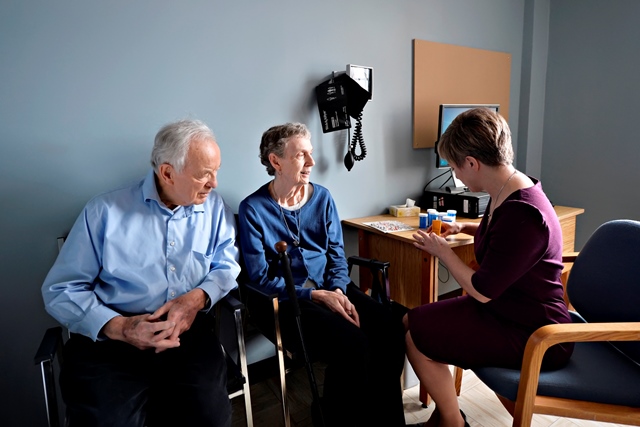By Michaela Berniquez
What is “problematic polypharmacy”?
We can all think of someone we know who takes a number of prescription drugs. Maybe it is a parent, a friend or it might even be you. Using many prescription drugs at the same time can lead to “problematic polypharmacy”. Problematic polypharmacy is the use of more drugs than clinically needed. Problematic polypharmacy can result in a number of side effects such as falls and negative impacts on attention and thinking.
Why are seniors at higher risk for “problematic polypharmacy”?
As our population ages, there are more people living with chronic diseases. Prescription drugs play a key role in disease and symptom management. According to the Canadian Institute for Health Information (CIHI), nearly two-thirds of people aged 65 and older are taking at least five prescription drugs, while nearly 40 per cent were taking 10 or more prescription drugs. Polypharmacy is of particular concern for older adults as they respond to medication differently. Older adults can also be frail and are not typically a part of the research used to develop the guidelines used when drugs are prescribed. Polypharmacy increases the risk for things like bad side effects or drug interactions, falls and broken bones, hospitalizations and higher healthcare costs. Polypharmacy can also contribute to a decline in how people function or think. Polypharmacy can also lead to confusion in how to take prescription drugs properly or can lead to people not taking them at all.
What is “deprescribing”?
Deprescribing is the planned and supervised process of dose reduction or stopping medication that may be causing harm or no longer providing benefit. The goal is to reduce the negative impacts of prescription drugs and harm in patients, while maintaining or improving quality of life. Deprescribing should always be done with planning and supervision by a health care provider to make sure it is the best plan for the patient and is safe.
How does deprescribing help to address “problematic polypharmacy”?
As life changes, medication needs may change as well. Prescription drugs that were once a good choice might not be the best choice over time. Over the course of a patient’s life, health care providers want to keep in mind balancing the benefits of a drug with the harms. Deprescribing is part of good prescribing – backing off when doses are too high, or stopping prescription drugs that are no longer needed.
Deprescribing is a team effort. Conversations about deprescribing among health care providers and patients can be made easier when everyone is aware of the benefits and harms of certain drugs, how these can change over time, and what to do about it. In partnership with a health care provider, it is possible for patients to improve the number and kinds of drugs they take with the goal of maintaining a healthy quality of life.
The Bruyère Deprescribing Guidelines research team
The Bruyère Deprescribing Guidelines research team is based out of the Bruyère Research Institute in Ottawa. The team is lead by Dr. Barbara Farrell, Scientist at the Bruyère Research Institute and Pharmacist at the Bruyère Geriatric Day Hospital. As a pharmacist, she sees many older people often taking more than 20 prescription drugs a day. However, working closely with doctors and a team of other health care providers, patients and their families, she is able to help reduce or stop medications safely. Her clinical experience at the Day Hospital was the reason behind the development of the deprescribing guidelines. At the Day Hospital, Dr. Farrell saw that health care providers were aware of the risks of problematic polypharmacy but they needed more education, tools and support to deprescribe.
With funding from the Ontario Government through the Ontario Pharmacy Evidence Network, the Bruyère Deprescribing Guidelines research team developed three drug-specific, evidence-based guidelines. They support health care providers in safely reducing or stopping prescription drugs and monitoring for effect. Further deprescribing guidelines and tools and resources have also been designed to build awareness, knowledge and capacity amongst health care providers and the public, with support from the Canadian Institutes of Health Research, l’Institut universitaire de gériatrie de Montréal, the Government of Ontario through the Bruyère Centre for Learning, Research and Innovation in Long-Term Care, the Canadian Foundation for Pharmacy and the Centre for Aging and Brain Health Innovation to develop
Available resources and staying informed
A number of deprescribing resources, including decision-support algorithms, whiteboard videos, information pamphlets, and infographics, have been developed by the team. These resources are available for free on their website, deprescribing.org. Some of the resources inform patients and family caregivers about deprescribing and support them in talking to their health care providers about their prescription drugs. Other tools were designed in partnership with healthcare providers to provide education and decision support around the deprescribing process. To stay up to date on the activities of the team follow them on Twitter (@Deprescribing) or sign up for their quarterly e-newsletter. For more information on the Bruyère Deprescribing Guidelines research team, their evidence-based guidelines and support tools, please email deprescribing@bruyere.org.
Michaela Berniquez is a Communications Assistant at Bruyère Research Institute and Bruyère Centre for Learning, Research and Innovation in Long-Term Care.


